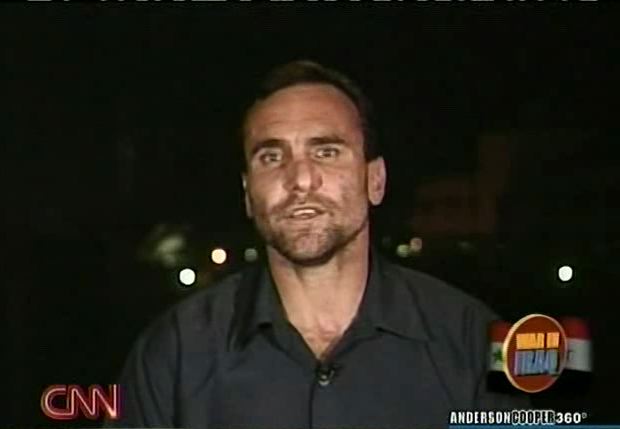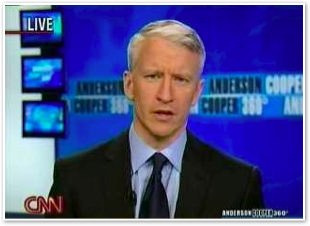AC: The latest from Iraq

Click photo to play
Length: 1:36
ANDERSON COOPER: Those are insurgents in Ramadi, practically owning the streets. And all over the country, violence is spiking. People in Baghdad now averaging about two and a half hours of electricity a day. In other words, they spend most of their time without power and often living in terror.
The question tonight: What to do now that the plan for first securing Baghdad and then the rest of the country doesn't seem to be working?
We talked about that earlier with CNN's Michael Ware and CNN terrorism analyst Peter Bergen.
(BEGIN VIDEOTAPE)
COOPER: So Michael, General Caldwell says that the increased violence is disheartening, and essentially saying that this U.S. strategy of focusing on some neighborhoods in Baghdad has been a failure, or hasn't worked as they'd like. Was the policy itself -- did the strategy just not work, or are things just so out of control that no strategy would be working right now?
MICHAEL WARE, CNN CORRESPONDENT: Well, Anderson, it's a little bit of both, I would guess. I mean, let's look at the so-called Battle of Baghdad plan: To move through the city chunk by chunk, targeting areas of volatility, surging, as the military calls it, flooding these areas with American forces and Iraqi forces.
The fundamental flaw in the plan is that after the Americans would leave, they would hand over responsibility to the Iraqi security forces. This means the police, the national police, and the army: the very people who are linked to much of the violence, be it the death squad violence or the insurgents.

Click photo to play
Length: 0:48
ANDERSON COOPER: Michael, how dangerous is it in Baghdad right now? I mean, General Caldwell said there are at least 23 militias operating in and around Baghdad. You have these death squads, often in police uniforms. I mean, when you get stopped at a roadblock by Iraqi police, how scared are you?
WARE: Well, this is the thing. You drive around a street corner here in the capital, and lo and behold suddenly there's a checkpoint in front of you. Sometimes these guys aren't even in uniform, and when they are there's absolutely no assurance whatsoever that it's legitimate. I mean, every time you encounter a checkpoint, in one way or other, whether your life is in your hands or not, certainly your security and your liberty is. You honestly don't know who these guys are.
COOPER: Frightening days. Michael Ware, appreciate it. Peter Bergen, thanks.

Click photo to play
Length: 1:57
ANDERSON COOPER: We made a tough call last night when we chose to air a report from Michael Ware showing sniper teams shooting at American troops. We did it knowing that it might disturb you. We know, because it certainly disturbed us as well.
How can anyone look at the images of Americans literally being hunted on the street in Iraq and not feel terror and sorrow and outrage? Not to show it, however, we think does a disservice -- not just to the truth, but to the sacrifice of nearly 3,000 men and women.
This is how the story came to us. We sent a list of questions to a group of insurgents. They sent back answers and this tape -- to establish, I suppose, their credentials.
We did not sit down or spend any time whatsoever with these killers, and the fact that the insurgency sent us the tape does not change the picture it shows.
Besides, even if there weren't a single camera around to record it, insurgents would go on shooting Americans. They are the enemy, and that's what they do.
Certainly not everyone sees it that way, however. A debate is forming and a healthy one, we think.
Our viewers and emailers to the blog are weighing in as well.
Debbie in Denham Springs, Louisiana writes to us: "Honestly, I found it absolutely disturbing and terrifying, but I needed to see it. CNN handled this story in the best way possible and without watering down the brutality of this war."
Joseph in Norwood, Massachusetts begs to differ: "Sensational, shocking, in your face news. That's what it's all about with CNN. It doesn't matter that this video tears out the heart of a soldier's mother, father, family and loved ones. I'm shocked, but more sad that CNN would go this far."
There is also this from Rodney in Plano, Texas: "I served in Iraq last year. I often said that, quote, "to CNN, if it's not blowing up, it's not news." Now I'm disgusted by CNN's decision to air this video. No amount of spin can justify the damage you've done."
Tom in Chicago, also served in Iraq. He writes: "As a soldier in the Army, I can appreciate the professionalism that you have presented the real story of so many Americans overseas. I believe that many here in the States fail to realize the full impact of the war on our service members fighting that fight. Thank you for bringing to light, at least in a small way, their sacrifices."
A very healthy debate, and we thank you all for taking part of it, and no doubt it will continue.
